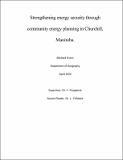Strengthening energy security through community energy planning in Churchill, Manitoba
Metadata
Afficher la notice complèteAuthor
Kvern, Michael.
Date
2020-04Citation
Kvern, Michael. Strengthening energy security through community energy planning in Churchill, Manitoba. [Undergraduate Thesis,] Department of Geography. Winnipeg, Manitoba, Canada: University of Winnipeg, April 2020. DOI: 10.36939/ir.202312051543.
Abstract
Imagine that it costs you $100 to fill your car’s gas tank, and no one outside your isolated community is working to improve things. This scenario is a reality for many northern remote communities like Churchill, Manitoba, where traditional energy security definitions and centralized systems have left them with unaffordable, unsustainable power. This thesis begins the process of community energy planning in Churchill by creating a community energy profile, and vision statements to guide a future energy plan. It also examines, from a Northern perspective, energy security definitions, and their effectiveness in remote communities. Twenty-three semi-structured snowball interviews and a workshop (n=12) identified community priorities for an energy vision statement and future energy plan. The energy profile was constructed in Microsoft Excel with data from utility companies and government and visualized using ArcGIS 10.7.1. Interview and workshop data were analysed using Nvivo12 to identify common themes. Being a remote community, Churchill has limited diversity in its energy sources. 75% of Churchill’s energy consumption is fossil fuels, including 5.4 million litres of jet fuel. Consequently, residents consume 35%more fossil fuel than the average Canadian. A significant portion of this can be attributed to the community’s remoteness, but also the high rates of tourism with a reliance on air travel. Such high rates of fossil fuel consumption are viewed negatively in the community. All workshop participants and twenty-one interviewees mention a strong desire for Churchill to utilize more renewable energy sources. Increasing renewable energy is a seen as crucial to reducing greenhouse gases and improving sustainability in the community. Opportunities to increase the efficiency of the energy system through upgrades to building conditions, improved technology, and energy efficiency programs are also identified and viewed favourably by participants. Energy generation occurs largely outside of the control of the community. Manitoba unique monopolistic electricity market, and government ownership of a significant portion of housing in the community results in most decisions being made outside of the community with little opportunity for input. Fourteen interview participants and all workshop participants identified increased agency as crucial to the future of the energy system. Draft vison statements for Churchill’s future community energy plan, and a reconceptualized definition of energy security included the identified elements of agency and efficiency. Churchill’s energy profile also provides the foundation to an energy plan as energy consumption is more precisely known and visualized. This research illustrates an example of energy planning to other northern communities, and in partnership with the CASES project provides ongoing support for the development and implementation of the plan.

